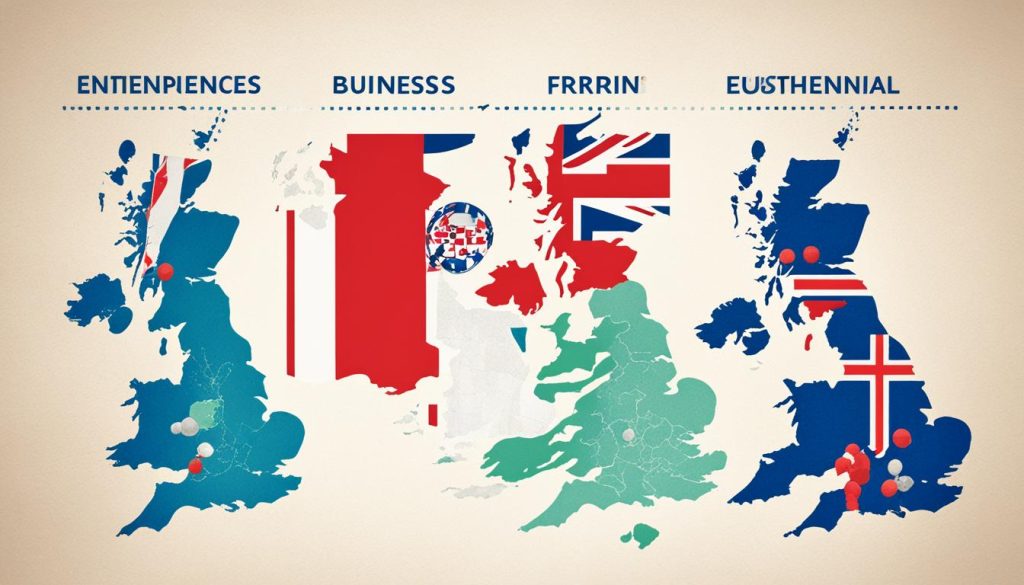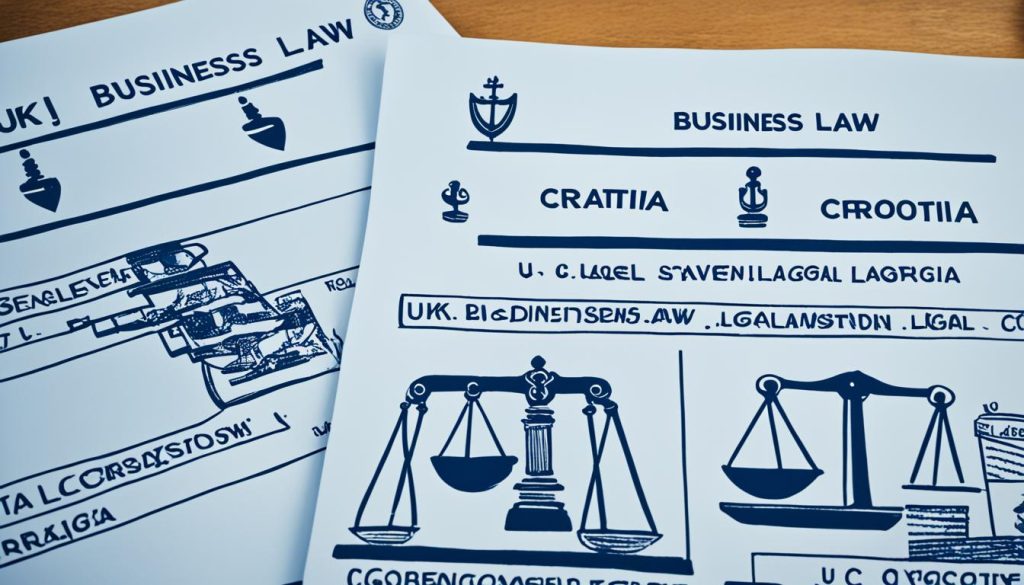Crossing oceans and markets, we see business and culture closely intertwined. The United Kingdom stands as a major economic force with a long history. Croatia, on the other hand, shines with its unique culture and growing business scene. This piece explores the business dynamics and cultural distinctions between the UK and Croatia. It’s vital for those in business aiming to thrive in these European landscapes.
Key Takeaways
- Knowing the different business methods in the UK and Croatia helps build strong business bonds.
- A cross-cultural look can reveal deep insights into corporate lives and consumer actions.
- Understanding UK and Croatia cultures aids in making wise business moves and smooth personal interactions.
- The business relationship between the UK and Croatia shows the need to adjust to varied economies and cultural views.
- Aspects like law, business ethics, and marketing are shaped by the UK’s and Croatia’s cultures.
Introduction to UK-Croatia Business Relations

Building strong international business relationships is key in today’s economy. The UK and Croatia have shown how beneficial these can be. Their relationship has grown from simple trades to complex partnerships. These efforts show a dedication to growth that helps both countries.
The economic ties between the UK and Croatia have grown, covering many sectors. Tourism, technology, and manufacturing are just a few areas where they work together. This shows how countries can overcome distance and differences. It highlights the importance of working together in today’s wide market.
“Both the UK and Croatia are committed to strengthening our economic ties, ensuring we can harness shared opportunities and tackle common challenges in the ever-evolving international business landscape.”
Since Brexit, the UK and Croatia have looked for new ways to work together. Their efforts in economic diplomacy are showing results. They want to grow their business ties and increase trade and investment.
- Dialogues between trade commissioners to improve bilateral agreements
- Annual business summits that bring together UK and Croatian enterprises
- Joint initiatives aimed at promoting small and medium-sized enterprise (SME) growth
- Collaborative tech innovation programs focused on driving digital transformation
In this new post-Brexit era, the relationship between the UK and Croatia is very important. It shows the strength and potential of working closely with international partners.
Economic Indicators: United Kingdom vs Croatia

The wealth of nations can often be seen by looking at key economic indicators. These give insights into their economic health and potential for attracting investors. When comparing the United Kingdom with Croatia, we see differences, similarities, and unique stories in GDP, job rates, and foreign investments. These comparisons help investors understand how these economies are moving and their strengths.
Gross Domestic Product (GDP) Comparison
The UK’s GDP is much larger than Croatia’s, showing the UK’s might in the global economy. Growth rates are also important to note. The UK’s economy grows steadily. Croatia, however, sometimes sees higher growth percentages, showing its emerging market status. This situation highlights the UK’s stable growth and Croatia’s growing opportunities.
Unemployment Rates and Economic Growth
Unemployment rates tell us a lot about a country’s economic health. The UK usually has lower unemployment, thanks to a mature economy and varied jobs. On the other hand, Croatia faces higher unemployment but is bouncing back, especially through tourism. This shows Croatia’s economic strength and potential to fix job market issues.
Foreign Direct Investments: Trends and Impacts
FDI indicates how appealing a country is to international investors. The UK stands out due to its stability and strong legal system, attracting lots of FDI. Croatia has seen more FDI since joining the EU. This shows growing trust from investors, especially in services and tourism.
In conclusion, examining GDP, economic health, and FDI shows the unique economic paths of the UK and Croatia. These factors are key for those looking to invest in these European nations.
Compare Business and Culture between United Kingdom and Croatia

Understanding cross-cultural intelligence is vital for businesses in the UK and Croatia. These two countries offer unique challenges and opportunities in trade, thanks to their cultural diversity. We’ll look at communication, negotiation, and how they conduct business, which are shaped by their local cultures. This includes business etiquette differences too.
In the UK, businesses value being practical and on time. This reflects the wider European approach to business. Croatian companies, though efficient, are more flexible. This is due to their culture’s focus on relationships and warmth. Knowing the subtle signals in both British and Croatian business settings is crucial. Whether it’s the British use of humor to connect or the Croatian focus on trust, getting these nuances right is key.
Being skilled in cross-cultural intelligence means understanding and respecting cultural diversity. Knowing how British firms structure their hierarchy helps in respecting authority lines. In Croatia, however, there’s a more equal approach. These might seem like small differences, but they greatly impact negotiations and joint projects.
| Aspect | United Kingdom | Croatia |
|---|---|---|
| Business Communication | Formal and reserved | Direct but personal |
| Negotiation Style | Pragmatic and reserved | Relationship-oriented |
| Organisational Hierarchy | Clearly delineated | More horizontal |
| Social Interaction in Business | Less emphasis on social settings | Important for building connections |
| Decision Making | Top-down approach | Group-based and inclusive |
Understanding business etiquette differences goes beyond simple greetings. It’s also about recognising how fast decisions are made or how formal meetings are. By being aware, businesses can adapt their strategies to fit local customs. This helps in earning respect and making negotiations smoother.
Being adaptable and sensitive to cultural diversity is essential in our global market. As businesses expand internationally, appreciating and embracing different cultures is crucial. This not only builds strong partnerships but also boosts your company’s global image and success.
Knowing about cross-cultural intelligence can make or break a deal. Paying attention to, learning about, and valuing cultural diversity bridges the gap in international business. Companies in the UK and Croatia will benefit greatly from developing these skills.
Corporate Culture in the UK and Croatia

The UK and Croatia have unique corporate worlds shaped by history and economics. They each have their own way of handling company management, talking in business, and everyday work life. Knowing about these cultural aspects helps in working together effectively across borders.
Workplace Hierarchies and Management Styles
In the UK, companies mix old-style hierarchies with newer, flat structures. They focus on getting results and encourage workers to be initiative-taking and responsible. On the other hand, Croatian firms usually have clear ranks, with top bosses making decisions in a group-oriented style.
Communication Patterns in Business Environment
Talking to each other in business shows more differences. UK businesses like straight-to-the-point chats, especially in deals or meetings. Croatian companies, however, prefer building relationships first. They take a roundabout way to discussions, valuing trust and rapport before diving into business matters.
Attitudes Towards Punctuality and Work-Life Balance
Punctuality opinions also vary: the UK is strict, while Croatia is more laid-back about time. Both value balancing work and personal life, yet the UK’s work scene is more hectic. Croatia leans towards enjoying life more outside the office.
| Aspect | United Kingdom | Croatia |
|---|---|---|
| Management Style | Results-oriented, individual initiative | Top-down, collective approach |
| Communication | Direct, succinct | Indirect, relationship-focused |
| Punctuality | Essential | Flexible |
| Work-Life Balance | Competitive, fast-paced | Relaxed, life-enjoyment focused |
Consumer Behaviour and Trends
To keep up with market trends, knowing consumer preferences is key. It helps in making good business strategies. The UK and Croatia have different purchasing habits. Understanding these can help businesses stay ahead. This look into how consumers behave in these countries can give useful tips for tweaking products and marketing.
In the UK, more people shop online now, especially after recent global health events. They want eco-friendly packaging and quick delivery. UK shoppers stay loyal to brands that offer great customer service. This shows companies need to focus on making customers happy.
In Croatia, things are a bit different. People there prefer buying local products. This shows their love for their culture. They also look for good deals, checking if a product’s quality is worth its price. Here, companies must ensure they offer value without making things too pricey.
- Rise of ethical consumerism in the UK
- Preference for local brands among Croatian consumers
- Quality vs. cost trade-off in Croatia’s purchasing habits
- Growth of e-commerce and digital marketplaces in the UK
Understanding target markets is crucial. Some trends are global, but others depend on a country’s culture and economy. A business that can cater to specific needs and preferences will stand out in these different markets.
Industry Sectors: Strengths and Opportunities

The UK’s leading industries and Croatia’s growing sectors show many trade possibilities and investment chances. This knowledge is crucial for businesses wanting to grow and for entrepreneurs seeking new opportunities. Let’s look at the strengths and potential in these markets.
Key Industries in the UK
With a diverse and advanced economy, the UK leads in several key industries. Its financial services, especially in London, are known worldwide. The pharmaceutical and automotive sectors are also thriving, showing growth and innovation. Industries like energy, aerospace, and digital technology provide a strong base for the UK’s economy, offering many investment chances.
Emerging Sectors in Croatia
Croatia may be smaller, but it has exciting potential in several areas. Tourism is a major draw with its beautiful coastlines and historic cities. The ICT sector is growing fast, thanks to a skilled workforce and low costs. Renewable energy and life sciences are also booming, leading to new advancements.
Opportunities for Bilateral Trade and Investment
Trade between the UK and Croatia could benefit both, improving relations. There are chances for sharing knowledge, starting joint ventures, and entering new markets. With Croatia joining the EU and the UK adjusting post-Brexit, now is a great time to boost business ties for economic gain.
Starting a Business: Procedures in the UK and Croatia

The UK and Croatia both offer great opportunities for new businesses. Starting a business in these countries requires understanding their processes. The UK’s setup process is straightforward compared to Croatia’s complex one. Both are improving their support for start-ups.
This analysis looks at how to start a business in both places. We examine registration, the time it takes, and support available. Our goal is to help entrepreneurs understand these markets better.
| Procedure | United Kingdom | Croatia |
|---|---|---|
| Company Registration | Online through Companies House; typically completed within 24 hours | Through the HITRO.HR service or in person; can take several days to a few weeks |
| Legal Framework | Common Law system; relatively flexible | Civil Law system; extensively regulated |
| Start-up Support | Various government grants and schemes such as Start Up Loans | EU funds available; initiatives like Hamag-Bicro for entrepreneurial support |
| Taxation | Corporation tax applies; multiple incentives for small enterprises | Profit tax with incentives for specific business activities |
| Administrative Burden | Low; Annual Confirmation statement required | Moderate; Various reporting requirements dependant on business size |
| Entrepreneurial Resources | Wide availability of co-working spaces and incubators throughout the UK | Growth of start-up hubs, particularly in major cities like Zagreb |
| Initial Capital Requirements | Minimum share capital of £1 for private companies | Minimum share capital of HRK 20,000 for limited liability companies |
Both countries are good for business, but the UK is quicker and simpler. Croatia benefits from EU membership, gaining access to funds and markets. This has improved its start-up scene.
“The UK’s start-up ecosystem is advanced, offering a lot of resources and a quick setup. Croatia is making great efforts to help start-ups, focusing on support and European integration.”
The UK and Croatia support entrepreneurship with their resources and systems. Each offers unique advantages to business owners, depending on their needs and plans.
Legal and Regulatory Differences

The business world of any country is shaped by its laws and rules. Knowing these is crucial for success in different places. We will look at how laws on business, taxes, and intellectual property in the UK and Croatia differ.
Business Law and Compliance
Business law varies between the UK and Croatia, affecting company operations. It’s important for fair play, consumer protection, and good corporate behaviour. The UK uses Common Law and demands careful checks, while Croatia has strict Civil Law rules to follow.
Taxation Systems and Rates
Thinking about taxes is key for businesses going global. The UK offers competitive corporate taxes and benefits, aiming to attract business. Croatia supports its growing economy with tax breaks and exemptions, hoping to draw in both local and global investments.
Differences in VAT and corporate taxes between the countries can impact company profits.
Property Rights and Intellectual Property
Intellectual property laws protect business innovations and advantages. The UK’s strong IP laws encourage innovation. Croatia follows EU rules, offering solid IP protection. Companies need to understand these laws to protect their creations and use their IP rights well.
| Aspect | United Kingdom | Croatia |
|---|---|---|
| Corporate Tax Rate | 19% | 20% |
| VAT Standard Rate | 20% | 25% |
| Compliance Burden | Lower | Higher |
| IP Protection Ranking | High | Moderate to High |
| Legal System | Common Law | Civil Law |
It’s essential to understand the importance of IP protection, tax laws, and business compliance. The legal landscapes of the UK and Croatia offer different challenges and chances. They need careful thought and expert help to navigate.
Impact of Cultural Differences on Negotiations

It’s key to know how negotiation methods differ across the globe to succeed. How culture impacts this is crucial. We will look at how UK and Croatian cultures shape negotiations. We’ll also give tips on adjusting your strategy to overcome these cultural gaps.
When you negotiate in the UK, expect a focus on practical solutions and keeping things private. Croatians, however, value building personal ties and trust. These different styles can change how business talks progress and their outcomes. Knowing these cultural norms is key.
- UK negotiators often stick to a professional approach, favoring written messages and clear contracts.
- Croatians prefer a more relaxed style, where spoken promises are important and meetings might happen at social events.
To manage these varying styles, you must develop a flexible negotiation skill set. Companies that get and respect these differences tend to build lasting partnerships and thrive in international settings.
| Aspect of Negotiation | UK Approach | Croatian Approach |
|---|---|---|
| Communication Style | Direct and to the point | More indirect, focusing on context |
| Building Relationships | Valued but secondary to the deal | Seen as vital, often before talks |
| Formality Level | Very formal, punctuality matters | More easy-going with time |
| Decision-Making | Usually follows a set hierarchy | Aimed at reaching a group consensus |
In sum, by being well-prepared and culturally savvy, businesses can adapt their negotiation approaches. This makes successful and beneficial deals more likely with international partners.
Navigating Through Bureaucracy

In international business, understanding and managing bureaucracy is key. The UK and Croatia each have their own challenges. We must develop skills to handle these differences efficiently. This will ensure our business runs smoothly in both places.
Dealing with Red Tape in the UK
The UK has strong bureaucratic processes focusing on due diligence and legal rules. To be efficient, one must fully understand these regulations and be proactive. Even though it’s complex, the system aims to be transparent and fair.
Bureaucratic Challenges in Croatia
Entrepreneurs in Croatia face tough bureaucracy. The processes can be slow, requiring patience and a good grasp of local laws. Still, Croatia is working hard to make things smoother for businesses.
Cross-Cultural Competence in Administrative Affairs
Managing cross-cultural interactions well is crucial in dealing with bureaucracy abroad. It helps greatly in communicating with local authorities or handling documents. It’s not just about language skills. Understanding local business customs and expectations is also important.
| Aspect | UK | Croatia |
|---|---|---|
| Starting a Business | Streamlined process with online support | More traditional steps and potentially longer wait times |
| Regulatory Compliance | Stringent and detailed compliance checks | Progressively adapting to EU standards |
| Cultural Nuance in Administration | High expectation for punctuality and formality | Valuation of personal relationships in administrative dealings |
| Taxation | Comprehensive online tax filing systems | Efforts to simplify tax administration for businesses |
Role of Technology and Innovation
The swift pace of technological advancements plays a big part in today’s digital economy. It’s changing the game in the UK and Croatia. Each country has its own way of sparking new ideas and making the most of tech. The UK leads in tech research and development. Croatia, on the other hand, is known for quickly adopting new business technologies, especially in its growing start-up scene.
Embracing the digital revolution is not an option but a necessity for economic leadership in today’s hyperconnected world.
New technologies are changing how businesses operate and talk to their markets. This push into the future helps both countries stay competitive globally. They’re finding new ways to win on the world stage by being innovative.
In the UK, investments in AI, quantum computing, and blockchain show a move towards clever inventions. Croatia is getting good at using digital tools in public services and e-governance. This shows its dedication to the digital economy. These steps make things work smoother, bolster transparency, and build trust in institutions which is key for attracting investments.
| United Kingdom | Croatia |
|---|---|
| Leadership in fintech innovations | Rapid growth in software development |
| Investment in clean energy technology | Adoption of smart city solutions |
| A stronghold in cybersecurity research | Expansion of e-government services |
When we think about tech and its future, we see a shared belief in the power of new tech. It not only pushes local markets forward but also lets businesses shine globally. The UK’s focus on research provides a base for innovation. Croatia’s quick use of new technologies shows how to stay ahead of trends. Though different, both nations prove that mixing technology with business leads to big changes and success in the digital economy.
Education and Workforce Competencies
Exploring educational systems and workforce abilities is key. We must think about how education and job market changes are crucial in growing vital skills for today’s economy. A look at the UK and Croatia shows us their approaches in preparing people for a changing business world.
Comparing Educational Systems
The UK is known for its high education standards. This helps create a skilled workforce. Croatia may be smaller, but it’s getting attention for its personalised and new educational methods.
Workforce Skills and Labour Mobility
In the UK, it’s easy to change jobs and fields, which helps people keep learning new skills. Croatia also has talented workers. But, moving between jobs is harder there because of a smaller market and different rules.
The Role of Language Proficiency in Business
Being able to speak many languages is crucial in the UK and Croatia for global business. Language skills help in understanding other cultures and improving soft skills. This makes it easier to work with partners from different countries.
| Criteria | United Kingdom | Croatia |
|---|---|---|
| Educational Standards | High, with a global reputation | Improving, with growing international recognition |
| Skill Set Development | Emphasis on creativity and innovation | Focus on specialised industries |
| Labour Market Flexibility | Highly flexible, fostering dynamic career moves | More regulated, but evolving in response to EU directives |
| Language Proficiency | English as a business lingua franca; increasing focus on additional languages | High levels of multilingualism, particularly in English, German, and Italian |
Social Responsibility and Ethical Practices
In today’s global market, corporate social responsibility (CSR) and ethical business conduct are crucial for companies in the United Kingdom and Croatia. These elements help build a good brand image. Moreover, they are seen as essential for long-term success.
By adopting sustainable practices, businesses in these countries can become more competitive and gain trust from consumers. In the UK, CSR is deeply integrated into business operations. Croatian companies also understand the benefits of ethical behaviour for their reputation.
The UK and Croatia have different laws for CSR, reflecting each country’s approach to responsible business. The UK’s Companies Act requires businesses to report their CSR efforts. Croatia follows EU directives that promote corporate sustainability and responsibility.
Companies in both countries face pressure to be transparent and responsible. They must address concerns in environmental, social, and governance aspects. Strategies include developing eco-friendly products, reducing emissions, ensuring fair work conditions, and supporting local projects.
Adopting ethical practices means having strict codes of conduct. Companies should ensure compliance through regular audits and training. This reinforces the role of ethics in the company’s culture and daily operations.
“The way forward for businesses lies in understanding that profitability and responsibility are not mutually exclusive but rather complementary facets of modern commerce.”
Thus, following ethical business conduct is about more than avoiding legal trouble. It’s about creating a strong, sustainable business that wins stakeholder trust. For many, a company’s commitment to sustainable practices influences their buying and investing decisions.
Finally, CSR and ethical conduct are ongoing efforts, shaped by changing laws and stakeholder needs. UK and Croatian businesses can lead in their markets through CSR. This shows the importance of these practices for success today and in the future.
Cultural Sensitivity in Marketing Strategies
Targeted marketing is most effective when rooted in cultural knowledge. This is crucial for connecting with local people. For businesses in the UK and Croatia, understanding cultural differences is key. Brand adaptation to local cultures makes marketing strategies work well across cultures.
Successful advertising case studies show how custom campaigns blend with local cultures. As companies move to new areas, making their brand culturally relevant is vital. This goes beyond just translating words.
Adapting Campaigns to Cultural Nuances
Adapting campaigns requires a deep understanding of local cultures. In Croatia, valuing traditions could win consumers. In the UK, being innovative and inclusive might work better. Knowing what each market likes makes targeted marketing effective and impactful.
Brand Perception: UK vs Croatia
What people think of a brand can vary between the UK and Croatia. Brits might look for heritage and trust in brands. Croatians could prefer brands that support local communities. Successful brand adaptation meets these expectations, keeping a global image.
Case Studies: Successful Cross-Cultural Campaigns
Looking at successful brands helps us learn. For example, using local influencers can make messages more relevant. This strategy has worked well in both the UK and Croatia. These examples show the power of knowing the culture and crafting messages well.
Understanding culture helps brands create meaningful campaigns. This connects consumers worldwide, helping businesses grow in a global market.
Building Cross-Border Partnerships
Creating strong cross-border partnerships offers many chances for businesses to grow. In UK and Croatian business ties, working together is key. Combining cultural knowledge with mutual economic goals can lead to successful alliances and joint efforts. Today, with global markets linked closely, such alliances are crucial for ambitious companies.
Starting this journey means deeply understanding local business customs, laws, and economic goals. UK companies are known for leading in international trade. By partnering with Croatian firms, they can merge innovation with local insights. This is true for tech, tourism, or trading goods and services. These partnerships help companies achieve great commercial success.
At the core of these international relationships are not just plans and logistics, but also the personal bonds formed. It’s the shared goals and strengths that make these partnerships last and be productive. By valuing different ideas and experiences, companies can unlock amazing possibilities. As the UK and Croatian markets grow, these partnerships show how unity can overcome global challenges.
















